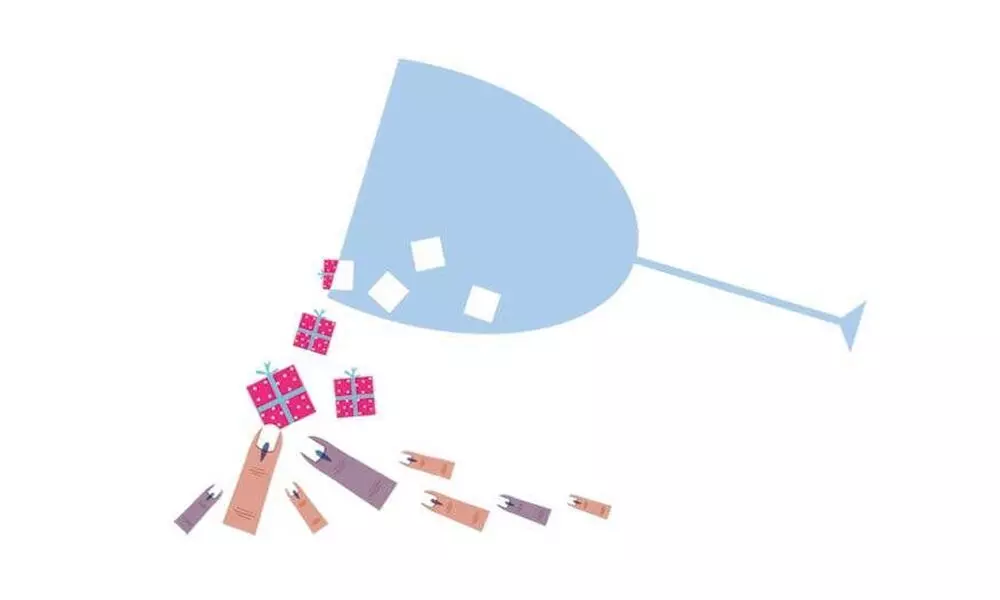Did freebies determine 2021 Assembly results?
Women voters were at the centre of most of the welfare schemes, cutting across party lines
image for illustrative purpose

New DelhiTHE results of the crucial Assembly elections held in five states/UT, including battleground West Bengal, announced on Sunday indicate that social welfare schemes, including cash transfer or freebies, seem to have played a crucial role in deciding the electoral fortune of various parties.
Welfare schemes of the Mamata Banerjee government in West Bengal were important in securing her third consecutive term in a high-stake electoral battle with the BJP.
Similarly, BJP-ruled Assam's "Orunodoi", a direct bank transfer (DBT) scheme, turned out to be a game changer for the party along with its politics of development.
Free bus rides for women and one-time financial assistance to all ration card holders helped the DMK to return in power in Tamil Nadu, after a decade in the wilderness.
Interestingly, women voters were at the centre of most of the welfare schemes, cutting across party lines.
In West Bengal, despite all its pre-poll promises for girls and women, the BJP failed to counter the Trinamool's 'Kanyashree' and 'Rupashree' schemes.
The BJP manifesto for West Bengal had promised to give nearly Rs 3.72 lakh overall to a girl child of the SC, ST, OBC and economically weaker sections. This comprised a bond of Rs 50,000 on birth, Rs 22,000 in four installments till Class XII, Rs 2 lakh to unmarried girls who complete Class XII and another Rs 1 lakh in a fixed deposit at the time of her marriage, which is more than the existing schemes of the Mamata Banerjee government, Kanyashree as well as Rupashree.
The Trinamool government's Kanyashree scheme, a conditional cash transfer programme, aimed at improving the status and well-being of the girl child in West Bengal by incentivising schooling of all teenage girls and delaying their marriages until the age of 18.
It had benefitted 70,49,247 beneficiaries at an outlay of more than Rs 7,588 crore.
In the Rupashree scheme, a one-time financial grant of Rs 25,000 was given to the economically stressed families at the time of their adult daughters' marriages, to mitigate the difficulties that poor families face in bearing the expenditure of their daughters' marriages, for which they often have to borrow money at very high interest rates.
Meanwhile, the 'Swastha Sathi' scheme provides basic health cover of up to Rs 5 lakh annually for secondary and tertiary care of a family.
Under the scheme, all pre-existing diseases are covered, there is no cap on the family size and parents of both the spouses are covered along with all dependent/physically challenged persons in the family. The entire premium is borne by the state government with no contribution from the beneficiary. With a budget of Rs 2,000 crore, the scheme benefited more than 10 crore people who applied for it.
Another welfare scheme of the Banerjee government, Khadya Sathi, benefitted 8.6 crore beneficiaries with a budget of Rs 5,000 crore. The main purpose of this scheme was to ensure food and nutrition. The backward classes include people from primitive tribal groups, workers of closed tea gardens, pavement dwellers of Kolkata, residents of Darjeeling hill area and inhabitants of Jangalmahal got food grain at the rate of Rs two per kg. This apart, another 50 lakh people, who applied in the 'White form' got food grains at half of the market price.
Under Assam's 'Orunodoi', started last year and benefiting 17.99,218 women, Rs 830 every month was given to 17 lakh qualified beneficiaries. The scheme benefitted 15 000 to 17,000 families in each assembly constituency depending on its demography, and turned out to be a game change for the BJP.
With the 'three measures' (around 4.5 kg) of rice for Re 1 scheme introduced by DMK founder CN Annadurai in 1967, competitive populism has been touching new heights in the southern state of Tamil Nadu over time.
In the 2021 polls, the opposition DMK promised free bus passes to women to travel in city and town buses and one-time financial assistance of Rs 4,000 each to each ration card holder. The party also promised waiver of education loans, reduction in prices of petrol, diesel, milk and cooking gas cylinder by Rs 100.
The ruling AIADMK promised payment of Rs 1,500 per month for housewives, free washing machines, six free cooking gas cylinders and others benefits.
The consumer durable freebies began in Tamil Nadu, when the DMK in 2006 promised free colour television sets in its poll manifesto.
In the 2011 elections, the AIADMK, then under J Jayalalithaa, promised mixers, grinders, fans and laptops.
In nearby Kerala, the prime reason for the Pinarayi Vijayan-led dispensation retaining power, bucking the over 40-year-old tradition of alternative fronts, can be attributed to the way on how effectively he managed the distribution of free kits to all soon after the country went into coronavirus lockdown last year.
The last kit was given last month and an approximate over Rs 1,000 crore spent on the programme. Vijayan used to ask if such kits were supplied by the Centre, or any of the BJP-led state governments.
Another reason on how he managed to keep the huge sections of the underprivileged on his side was the prompt delivery of the social welfare pensions to 48 lakh people which went into arrears during the last few months of the Oommen Chandy-led Congress government (2011-16).
The Vijayan government not only cleared all the arrears but ensured that from April this year the monthly pension was hiked by Rs 100 to Rs 1,600.

